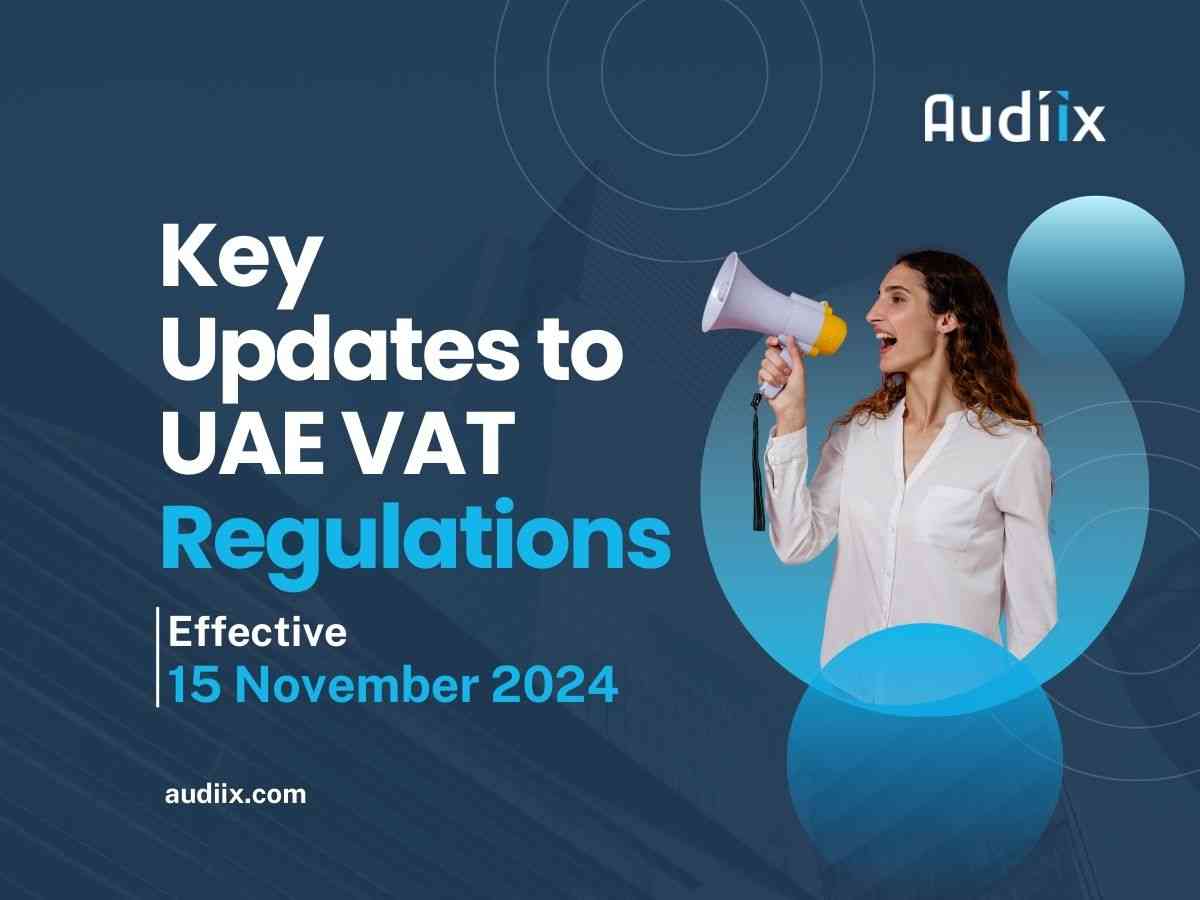Key Updates to UAE VAT Executive Regulations

Critical Changes Effective 15 November 2024
On 2 October 2024, the UAE Federal Tax Authority (FTA) issued Cabinet Decision No. 100 of 2024, which introduces significant amendments to the UAE VAT Executive Regulations under Federal Decree-Law No. 8 of 2017 on Value Added Tax (VAT). Set to take effect on 15 November 2024, these changes include over 30 amendments aimed at clarifying VAT treatment across multiple industries and addressing compliance inconsistencies. Below, we highlight the key changes and their implications for businesses.
Scope of Supply of Real Estate – Article 2
The scope of real estate supply has been expanded beyond the sale and lease of property. It now includes any other forms of disposal that result in the transfer of ownership from one person to another. This expansion ensures that a wider range of transactions, including non-traditional ownership transfers, are subject to VAT.
Exceptions Related to Deemed Supplies – Article 5
The amendment to Article 5 simplifies compliance by refining the thresholds for deemed supplies. Key changes include:
1- Small-Value Supplies: Supplies of goods with a value not exceeding AED 500 per recipient within a 12-month period are no longer considered deemed supplies. This applies to samples or commercial gifts.
2- Output Tax Thresholds:
- VAT on deemed supplies is capped at AED 2,000 per supplier over a 12-month period. Any amount exceeding this is considered payable VAT.
- For government entities or charities, the cap is AED 250,000 when the recipient is another government entity or charity. Any excess will be treated as payable VAT.
Profit Margin Scheme – Article 29
The updated regulations clarify the calculation of the profit margin under the Profit Margin Scheme. The profit margin, defined as the difference between the purchase and selling prices, must now include any associated costs or fees incurred during the purchase of the goods. This ensures a more accurate determination of the profit margin for VAT purposes.
Zero Rating of Exports of Goods – Article 30
The updates to Article 30 provide greater clarity on the documentation required to qualify for zero-rating of exported goods. The new regulations expand the types of acceptable evidence and adjust definitions, offering businesses more flexibility. Key points include:
Evidence of Exports: Acceptable documentation now includes:
- Customs declaration and commercial evidence (such as an air waybill, sea manifest, or land transport document).
- Shipping certificate and official evidence (including export certificates or clearance certificates issued by the customs authorities).
- Customs declaration proving a customs suspension arrangement.
Definitions Expanded: The regulations have broadened definitions to make it clearer what constitutes valid proof:
- Official Evidence: Export certificates from UAE customs or clearance certificates from destination countries confirming goods’ departure or arrival.
- Commercial Evidence: Documents from transport companies proving the goods have left the UAE, including air waybills, sea manifests, and land waybills.
- Shipping Certificate: A certificate from shipping companies that serves as an alternative when commercial evidence is unavailable.
This revision simplifies the proof of export and resolves challenges businesses faced under the previous requirement of obtaining an Exit Certificate.
Zero Rating of Exports of Services – Article 31
Additional conditions have been introduced for services to qualify for zero-rating. Services that fall under special place of supply rules—such as restaurants, hotels, cultural events, and transportation—are now explicitly excluded from zero-rating. Likewise, services directly connected to movable assets in the UAE are no longer eligible for zero-rating.
This update, while reflecting current practices, provides further clarity by confirming that such services are considered provided within the UAE and therefore cannot be zero-rated for VAT purposes.
Zero-Rating Healthcare Services – Article 41
The VAT zero-rating for healthcare goods and services has been extended to include the importation of healthcare-related goods. This means that healthcare services and goods provided within the UAE, as well as goods imported for healthcare purposes, will now be eligible for VAT zero-rating, reducing costs for healthcare providers and consumers.
Management Fund Services – Article 42
The VAT treatment of financial services has been updated, particularly for the management of investment funds and virtual assets.
Management of Investment Funds: These services, when provided by fund managers, for a fee, to funds licensed by a competent UAE authority, are now VAT exempt. Services include the management of the fund’s operations, investments, and performance.
Virtual Assets – Article 42
One of the major updates is the VAT exemption for Virtual Assets as part of financial services. Virtual Assets are defined as digital representations of value that can be traded or converted digitally and are used for investment purposes. The definition explicitly excludes digital representations of fiat currencies and financial securities.
The following activities related to Virtual Assets are considered financial services and are VAT exempt:
- The transfer of ownership of Virtual Assets, including virtual currencies.
- The conversion of Virtual Assets.
- The management, custody, and control of Virtual Assets.
This update aligns the VAT treatment of Virtual Assets with other financial services, ensuring that transactions involving Virtual Assets are treated as exempt supplies for VAT purposes.
Tax on Supplies of More Than One Component – Article 46
A key change in Article 46 is the introduction of a provision for cases where there is no clear principal component in a composite supply. Previously, the VAT treatment followed the principal component. Now, if no principal component can be identified, the VAT treatment will be determined based on the nature of the supply as a whole. This ensures the correct VAT application for complex supplies.
Input VAT Recovery on Employee-Related Expenses – Article 53
Article 53 has been updated to offer more flexibility in recovering input VAT on employee-related expenses, particularly health insurance. Key updates include:
- Input VAT Recovery: Businesses can now recover input VAT on both standard and enhanced health insurance for employees and their dependents.
- Covered Dependents: Recovery is allowed for insurance covering an employee’s spouse (up to one wife) and up to three children under 18 years of age.
This update broadens the scope of deductible employee-related expenses, providing businesses with a clearer framework for recovering VAT on health insurance costs.
Tax Invoices – Article 59
The amendments to Article 59 clarify the requirements for issuing tax invoices:
- Simplified Tax Invoices: These must now be issued on the date of supply, in contrast to full tax invoices, which can be issued within 14 days. Simplified tax invoices cannot be used for supplies subject to the Reverse Charge Mechanism.
- Summary Tax Invoices: If multiple supplies are made to the same customer in the same month, a summary tax invoice must be issued within 14 days of the end of that month.
- Invoices Issued by Agents: When an agent issues an invoice on behalf of a principal (e.g., an e-commerce platform invoicing on behalf of a merchant), both parties must keep records detailing the names, addresses, and TRNs of each other.

